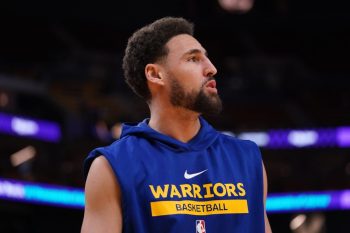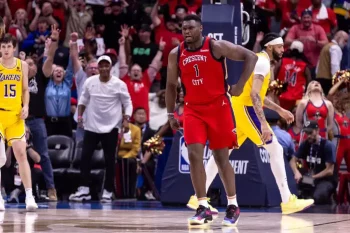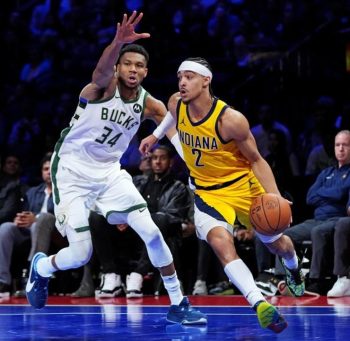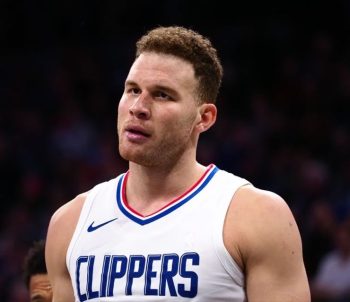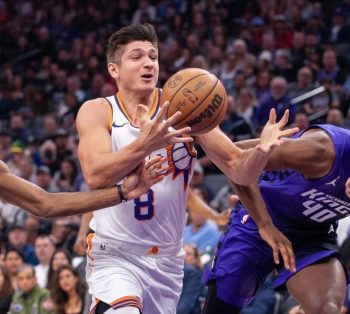NBA
John Jenkins Excited About Suns’ Direction

John Jenkins of the Phoenix Suns turned 25 years old in March, but you’d never know it from talking to him or his close friends. That’s because he exudes maturity and professionalism. While it’s become cliché to say, Jenkins is truly wise beyond his years and admits that he “feels like I’m in my 30s” rather than his 20s.
It’s rare for such a young player to be considered a veteran leader in the locker room, but Jenkins’ teammates – current and former – view him as an elder statesman even though he’s still just 25 and fighting for job security like many up-and-coming players.
Because Jenkins is a consummate professional, he has become a mentor for a number of former teammates despite the fact that he’s not much older than them.
Jenkins started his NBA career with the Atlanta Hawks and, in his second season, he took point guard Dennis Schroder under his wing. When the two met, Schroder was a 19-year-old rookie who was not only adjusting to the NBA, but also getting acclimated to America since he was born and raised in Germany. Even though Jenkins is only two and a half years older than Schroder and still had a lot to learn about the league himself, he did everything he could to help Schroder with his transition. Jenkins left the Hawks in 2015 to sign with the Dallas Mavericks, but the two players have stayed in contact and Schroder remains extremely grateful for everything that Jenkins did for him.
“My man John Jenkins! He was my guy from the beginning,” Schroder told Basketball Insiders. “He helped me with everything, basically. He showed me where to go out to eat in Atlanta, how you take care of your body and that you have to give 110 percent whenever you step on the court. The biggest thing [he taught me] was how to be a professional and be a good teammate. I hope he’s going to get his minutes this year because he’s going to kill it [in Phoenix]! He’s family for life.”
Upon hearing Schroder’s quote, Jenkins smiles and responds, “That’s my little brother, man.”
Schroder isn’t the only young player Jenkins has befriended and mentored. Last season, Dallas Mavericks rookie Justin Anderson, who is also 22 years old, viewed Jenkins as a big brother type. Even though they only spent half a season together because Jenkins was waived by the Mavs, they remain close. In fact, Anderson stayed at Jenkins’ house this week so that they could work out together and the mentee could continue to pick his mentor’s brain.
“Being with John as a rookie allowed me to not only see what it takes to just be in the NBA, but what it takes to stay in the NBA,” Anderson said. “Being around him daily at the start of last season showed me different elements that are key to staying in the NBA – from being professional to being patient to being a relentless worker. I tell him daily that he has a sickness, but it’s one that I’m hoping is contagious; I want to catch it because his work ethic is second to very few.”
“It’s funny to me because in college, I was always that same guy,” Jenkins said with a laugh. “I’d help recruit guys and then once they’d get here, I’d show them how to work hard, plan their days out and how to recover. I’m like a maniac when it comes to that stuff. That’s a big reason why Justin Anderson is staying at my place for this whole week. He wants to get right for Tim Grgurich’s camp in Vegas. My fiancée and his girlfriend are cool, so it’s fun. We’re working out and even though I was only with him for half of the year in Dallas, I made sure to help him because he was a rookie. I told him, ‘Look, I’m not the oldest guy on the team, but I know what it takes to keep your body fresh and how to handle an 82-game season.’ I just told him, like I tell all the young guys, ‘How bad do you want this? You’ll get 20 years, max, at this. You might as well go all out.’ That means working as hard as you can, eating right, taking care of your body and having a strong belief system. I try to pass that on to all of the guys I encounter because it’s helped me a lot so far.”
It’s easy to see why Phoenix would want Jenkins around their young, impressionable players.
The Mavs cut Jenkins on Feb. 22 of this year due to a logjam on the wing, and two days later the Suns claimed his contract off of waivers. He has two years remaining on his deal with Phoenix ($1,050,961 for the 2016-27 season, and $1,178,992 for 2017-18) although both salaries are non-guaranteed. Still, it’s hard to imagine the Suns letting him go on such a bargain deal, especially if he continues to produce and be a positive influence.
Last season, Jenkins did his best to help some of the Suns’ younger players, but making those connections wasn’t as easy since he joined the team midseason. Even still, he had a number of good conversations with Devin Booker, who was 18 years old when he made his NBA debut and finished fourth in Rookie of the Year voting.
Now, Phoenix will enter the 2016-17 season with three teenagers on their roster (Booker, Dragan Bender and Marquese Chriss) and a total of eight players who are 23 years old or younger. The Suns have brought in a number of veteran free agents to lead – such as Tyson Chandler (last summer), Jared Dudley and Leandro Barbosa among others – but Jenkins will try to do his part to help too in his first full season with the squad.
This side of Jenkins is rarely discussed outside of NBA circles. He acknowledges that it’s likely due to the fact that he’s typically reserved. However, he opens up around teammates because he loves sharing lessons he has learned and passing on any information that he feels can help his peers. In recent months, Jenkins was thrilled to see his friends experiencing success – with Anderson playing very well for Dallas in the playoffs and Schroder emerging as Atlanta’s starting point guard.
What’s next for Jenkins could be a breakout season of his own. He has bounced around the NBA a bit since being selected 23rd overall in the 2012 NBA Draft, suiting up for his third team in five years.
The fit with the Suns seems very good, though, and he played well after the team claimed him off of waivers in February. Last season, he averaged five points in 13 minutes per game while shooting an impressive 46.7 percent from the field and 40.6 percent from three-point range. In his two starts with Phoenix, he averaged 14 points, seven rebounds and 2.5 assists, while shooting 46.2 percent from the field and 42.9 percent from three.
Over the course of his career, he has averaged 5.2 points on 44.9 percent shooting from the field and 36.3 percent from three-point range. He has appeared in 141 regular-season games, but started in just eight games. He has also been to the playoffs twice, appearing in eight postseason games during his time with the Hawks. In his second postseason run with Atlanta, he shot 66.7 percent from the field and 50 percent from three-point range.
Jenkins’ career per-100-possession stats – 20.2 points, 5.9 rebounds, 3.2 assists and one steal – show how much he can impact the game when he’s given minutes.
In the last two months of last season, when Earl Watson was at the helm for the Suns, Jenkins’ minutes increased – Watson’s interim coaching tag has now been removed.
Jenkins fits Watson’s style of play, and there’s no question that he provides value when on the court. Last year, he led Phoenix in three-point percentage (40.6 percent) and elbow shooting percentage (50 percent). This skill set is a perfect fit for today’s NBA with the way shooting and spacing are valued, especially on a team like the Suns that likes to shoot from long distance – ranking 10th in the NBA in made threes per game last season.
Jenkins is also efficient, ranking second on the Suns in True Shooting Percentage (56.4) behind only Chandler, who obviously does his damage at the basket. Jenkins’ career True Shooting Percentage is an impressive 56.2 percent. He also ranked second on the Suns in assist-to-turnover ratio (1.13) last season, which likely helped earned Coach Watson’s trust down the stretch of the campaign.
Dudley, who re-joined the Suns on a three-year deal worth $30 million, is a fan of Jenkins’ game and believes the sharpshooter could be a difference-maker for Phoenix.
“Anytime you have a player like John who has a good basketball IQ and is a knockdown shooter, all you need to have is confidence and an opportunity,” Dudley said of Jenkins. “John will get his chance and when he does, he has to make the most of it.”
Basketball Insiders recently talked with Jenkins about how he joined the Suns, expectations for next season, Phoenix’s offseason moves, embracing a leadership role on the young team and much more.
Alex Kennedy: Being claimed off of waivers is a strange thing. Most people can’t relate to that process at all. There aren’t many other jobs where you’re let go and then a day or two later, an organization on the other side of the country can claim your contract and you have to relocate there immediately. What was it like going through that process and how did you ultimately land in Phoenix?
John Jenkins: “It was tough. It was my first time being in a situation like that and I loved Dallas. Being with them was great, but I was in a logjam playing behind two great players in Chandler Parsons and Wesley Matthews along with other veterans like J.J. Barea and Devin Harris. It was kind of like in Atlanta, where I was behind a veteran group of guys. I kind of expected [to be waived] when that time came because we were so guard heavy, and my contract likely meant that I was going to be the one to get cut. I had gotten some heads up, maybe three days before, but even still I wasn’t completely ready for that to happen. After my last game with the Mavericks, Coach Rick Carlisle told me to stand up and said a bunch of great things about me in front of the team. That was really cool of him. Then, a day later, I was waiting for the waiver period to pass to see if my contract would be cleared and if I’d become a free agent. Then, I was told by my agent that Coach Carlisle called the Phoenix Suns on my behalf and spoke highly of me. He looked out for me big time and I really appreciate that. I guess Phoenix liked what they saw from me when we played them in the preseason. [Editor’s Note: Jenkins averaged 19.7 points in 28.4 minutes for Dallas in the preseason]. They saw what I could do and they gave me a chance. That’s how I got here and I’m happy to be with the Suns now.”
Kennedy: That’s really interesting. Coach Carlisle is extremely respected around the NBA and is known for being one of the best coaches in the league. What did it mean to you to have that kind of backing from him, to have him looking out for you?
Jenkins: “It definitely wasn’t expected. I didn’t think he’d do what he did and go to those lengths to help me. I mean, it was in the middle of the season so he was worried about his guys, game-planning and what he had to do to get wins. For him to take time out of his busy schedule during the season to call another team about a player of his who was there for half the year, that meant the world to me. It gave me another chance to play in the NBA and keep my dream alive.”
Kennedy: You joined Phoenix in February, so you’ve been in the franchise for some time now. They have a very good reputation when it comes to their training staff and development program. What’s been your early impression of the organization?
Jenkins: “It’s been great. I love the direction that we’re heading in. We’re a very young team. I’m actually considered old compared to the guys on our team, even though I’m only 25. I thought that was pretty young, but I guess not (laughs). I’m pretty old compared to most of the guys in this group. The direction is great and I think they have the right people in place, from Coach [Earl] Watson all the way up to the front office to the owner Mr. [Robert] Sarver. I like the system that Coach Watson is putting in – it’s going to be great. I just like Coach Watson and what he’s about too. While I was in Las Vegas supporting the Summer League team, I was working out with a lot of the guys and it was great to get to know them even more. I just can’t say enough good things about the organization. The weight coach is incredible. The training staff always makes sure your body is feeling good at all times. Before every game, you’re on the table for at least 30 minutes so they can work on you and they can make sure your body is good. There are just a lot of things here that I wasn’t used to. I’ve been a part of two organizations that were big time in Atlanta and Dallas, but Phoenix is just one step [ahead] in terms of training and how they take care of their guys and all of that. They’re known for that and well respected when it comes to training and skill development and all of that.”
Kennedy: How much have you grown as a player and as a person from your first day in the NBA to right now?
Jenkins: “As a player, I’ve improved so much. It’s crazy. I’d say I’ve done a complete 180-degree turnaround, but it sucks because I haven’t really been able to play the minutes to show everybody just how much I have improved. I’ve gotten so much better and I’m a totally different player. When I first got into the league, I think I was known just as a shooter. While I still have the shooting ability, now I can take it off the dribble, finish at the rim, create for others – since I played some point guard in Dallas and a tiny, tiny bit in Phoenix – thrive in pick-and-rolls and things like that. There are just so many little things that I’ve added to my game. I’m looking forward to showing those thing off more. As a person, I’ve grown a lot too. As I mentioned, I’m getting married. My life has just been great. I’ve learned a lot of life lessons from basketball, like always staying patient, never getting down on yourself, how to handle money and how to deal with everything life throws at you. I feel like I’m 30 years old, not 25. I’ve been through a lot. I’ve had to change locations three times. Things like that force you to mature faster, because you have to. You don’t have a choice. My parents didn’t come out and live with me, I was alone and grew up. And now, having a wife, that’s definitely life-changing. Then, you’re making this money and you have to know how to manage it and be smart with it, so automatically you’re forced to act three or four years older than you really are. I’d definitely say I’m more like a 30-year-old than a 25-year-old.”
Kennedy: You had the chance to play for Earl Watson last season as he was adjusting to his first coaching job and learning the ropes. What did you think of the job he did?
Jenkins: “I thought he did a great job, man. When I got there, we were in a tough situation. We were losing a ton of games. Soon after I got there, we were able to pick it up a little bit, going on a couple two- and three-game win streaks. We were staying competitive against teams that were supposed to kill us, playing them really tough. Our confidence just kept rising and rising like, ‘Yo, we could be really good if we just keep trusting the process.’ That’s one thing that Coach Watson really preaches – trusting the process. I love everything that he’s about and he knows what he’s doing. He’s brought the same principles he learned from San Antonio and the other teams he’s been around and instilled them here. He’s a young coach [at 37 years old], but he’s wise beyond his years. He went to UCLA and as a teenager became close with John Wooden, who’s one of the best coaches ever. The things he says to us make you just think, ‘Wow, he’s ready for this job.’ I think he’s going to do a great job and he earned that job. They didn’t just give it to him. He earned it. When there were 20 games left in the season, he had us wanting to play every game and battle for him. Guys weren’t thinking about their vacations or anything like that, they were wanting to play hard for him. For him to be able to do that as a young coach, on a team that wasn’t going to the playoffs, in a frustrating season due to injuries and things like that, he kept us playing the whole year. That’s huge.”
Kennedy: The Suns added a number of players this summer, including veterans Jared Dudley and Leandro Barbosa and rookies Dragan Bender and Marquese Chriss. What do you think of those moves and how much better can this team be after making those additions?
Jenkins: “I thought Ryan [McDonough] and the front office did a fantastic job in everything they did. I watched the draft picks in Summer League and they looked great. They’re so young, man! Bender is 18 and Chriss is 19, yet they’re already doing things on the court where you’re like, ‘Okay, they have a chance to be special.’ I think they’ll play a lot. As far as the veteran presences, they brought in two guys who are like legends in Phoenix in Jared Dudley and Leandro Barbosa. They’ve been on the great teams that Phoenix has had, back when they played with Steve Nash and those guys. They know what it takes to win. Barbosa even has a championship ring now after playing for the Warriors. I think he’ll be able to take what he learned from Golden State and from his 13 years in the NBA and pass it on to us. We’re a young team, so we’re all ears. We’re a very hungry team. That’s one thing I’ve noticed about this group. We all want to get better and we strive for that every day.”
Kennedy: What are your expectations for next year? The playoffs have been discussed in Phoenix for the last few years. Is that a goal that’s being discussed?
Jenkins: “Yeah, that’s the goal and nobody should count us out as long as we stay healthy. Like I said, we’re so hungry. And we have a coach who is really hungry too. The organization as a whole just really wants to get back to that level again. We’re going to do the best we can. I had no idea what to expect when Coach Watson became the coach, but I’ve just been so impressed by him. What he’s already started to do has been great and I think everybody is just going to latch on and give it all that we’ve got. Health was a big issue last year. But we want to make sure that you have to respect Phoenix every time you play us. For anyone who thinks, ‘Oh, it’s going to be an easy win,’ it’s not going to be like that all. We have a good mix of veteran and young pieces, and we can be scary.”
